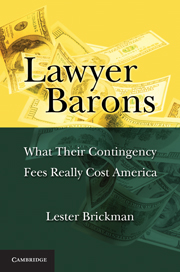Book contents
- Frontmatter
- Contents
- Foreword: Sorting Out Our National Liability Crisis by Richard A. Epstein
- Acknowledgments
- LAWYER BARONS
- Introduction
- 1 The Origin of the Contingency Fee
- 2 How Profitable Are Contingency Fees?
- 3 Are Contingency Fee Profits “Reasonable”?
- 4 How Tort Lawyers Have Increased Their Profits by Restraining Competition
- 5 Why the Market Has Failed to Correct the Absence of Price Competition
- 6 Impediments Imposed by the Bar to Price Competition
- 7 The Effects of Incentives Created by Contingency Fees
- 8 How the Quest for Profits Influenced the Development of the Tort System
- 9 Lawyers' Role in the Expansion of Tort Liability
- 10 The Role of the Judiciary in Tort System Expansion
- 11 Current and Future Expansions of Tort Liability
- 12 The “Litigation Explosion”
- 13 Measures of the Rate of Expansion of Tort Liability
- 14 The Relationship between Injury Rates and Tort System Costs
- 15 The Impacts of Substantial Increases in Tort Lawyers' Effective Hourly Rates
- 16 Class Actions
- 17 Fees in Class Actions
- 18 How Class Action Lawyers Game Fee Setting
- 19 Securities Class Actions
- 20 Regulation through Litigation
- 21 A New Role for Punitive Damages
- 22 For-Profit Partnerships between State Attorneys General and Contingency Fee Lawyers
- Conclusion
- Appendix A A Critique of Alex Tabarrok
- Appendix B Calculating Tort Lawyers' Effective Hourly Rates in 1960
- Appendix C Electronic Discovery and the Use of Contract Lawyers
- Appendix D The HMO Litigation
- Appendix E The GM “Side Saddle” Truck Litigation
- Appendix F Modern Class Actions Undermine Democratic Precepts
- Appendix G Other Ways Lawyers Game Class Action Fees
- Appendix H Nonrecourse Financing of Tort Litigation
- Appendix I Political Contributions by Tort Lawyers and the U.S. Chamber of Commerce
- Appendix J Special Rules Favoring Lawyers
- Appendix K The Ultimate Medical Expense “Buildup”: Whiplash
- Appendix L The Effect of Punitive Damages on Compensatory Awards
- Index
17 - Fees in Class Actions
Published online by Cambridge University Press: 05 June 2012
- Frontmatter
- Contents
- Foreword: Sorting Out Our National Liability Crisis by Richard A. Epstein
- Acknowledgments
- LAWYER BARONS
- Introduction
- 1 The Origin of the Contingency Fee
- 2 How Profitable Are Contingency Fees?
- 3 Are Contingency Fee Profits “Reasonable”?
- 4 How Tort Lawyers Have Increased Their Profits by Restraining Competition
- 5 Why the Market Has Failed to Correct the Absence of Price Competition
- 6 Impediments Imposed by the Bar to Price Competition
- 7 The Effects of Incentives Created by Contingency Fees
- 8 How the Quest for Profits Influenced the Development of the Tort System
- 9 Lawyers' Role in the Expansion of Tort Liability
- 10 The Role of the Judiciary in Tort System Expansion
- 11 Current and Future Expansions of Tort Liability
- 12 The “Litigation Explosion”
- 13 Measures of the Rate of Expansion of Tort Liability
- 14 The Relationship between Injury Rates and Tort System Costs
- 15 The Impacts of Substantial Increases in Tort Lawyers' Effective Hourly Rates
- 16 Class Actions
- 17 Fees in Class Actions
- 18 How Class Action Lawyers Game Fee Setting
- 19 Securities Class Actions
- 20 Regulation through Litigation
- 21 A New Role for Punitive Damages
- 22 For-Profit Partnerships between State Attorneys General and Contingency Fee Lawyers
- Conclusion
- Appendix A A Critique of Alex Tabarrok
- Appendix B Calculating Tort Lawyers' Effective Hourly Rates in 1960
- Appendix C Electronic Discovery and the Use of Contract Lawyers
- Appendix D The HMO Litigation
- Appendix E The GM “Side Saddle” Truck Litigation
- Appendix F Modern Class Actions Undermine Democratic Precepts
- Appendix G Other Ways Lawyers Game Class Action Fees
- Appendix H Nonrecourse Financing of Tort Litigation
- Appendix I Political Contributions by Tort Lawyers and the U.S. Chamber of Commerce
- Appendix J Special Rules Favoring Lawyers
- Appendix K The Ultimate Medical Expense “Buildup”: Whiplash
- Appendix L The Effect of Punitive Damages on Compensatory Awards
- Index
Summary
How Fees Are Set
The driving force behind class actions is lawyers' fees. Even so, there is no reliable record of the contingency fees that class action lawyers have garnered. Federal court filings and settlements are usually published, but most class actions have been filed in state courts where a record of decisions is not readily available. One study of a selected sample of 1,120 class actions in the period 1973–2003 found that fees in common-fund class actions totaled $7.6 billion. Another study of all class action settlements approved by federal judges in 2006–2007 indicated that the announced value of the settlements totaled $33 billion and that judges awarded nearly $5 billion in fees and expenses in these cases to the class action lawyers. I estimate that over the past thirty-five years, federal and state courts have awarded class action lawyers well in excess of $50 billion. This estimation does not include the fees generated by the states' suits against the tobacco companies, which were functional equivalents of class actions, brought mostly by state attorneys general in partnership with private contingency fee lawyers. When the suits were settled for $246 billion, the fees for the private lawyers – more than $15 billion payable over a twenty-five-year period – were so enormous that the private lawyers and the attorneys general, fearing a political uproar, sought to keep the fees from public view by creating a secret arbitration process to which the public was denied access.
- Type
- Chapter
- Information
- Lawyer BaronsWhat Their Contingency Fees Really Cost America, pp. 311 - 334Publisher: Cambridge University PressPrint publication year: 2011



